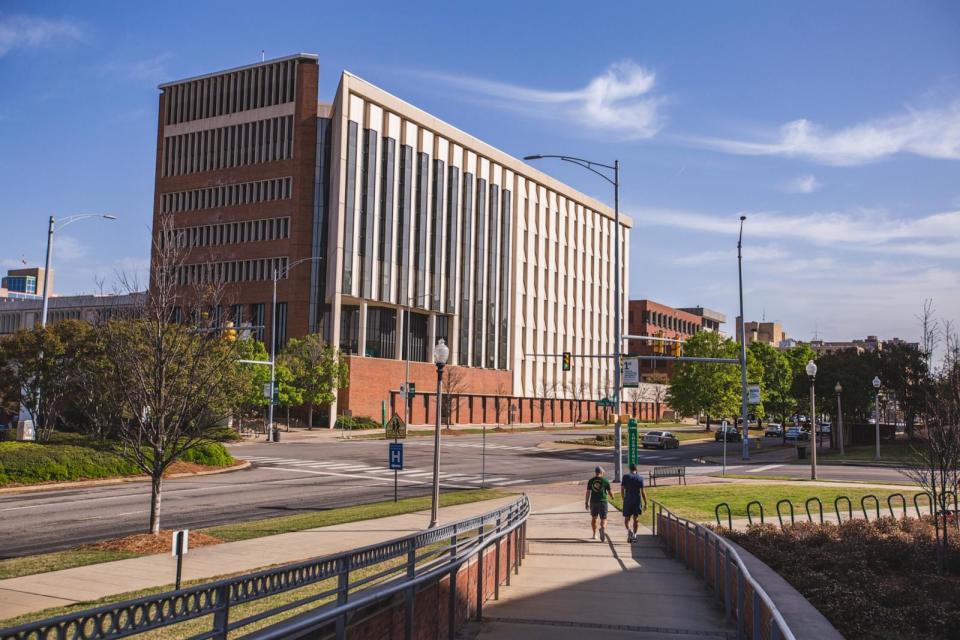Family of deceased inmate whose body was returned without organs wants answers

[The full version of this article can be found on Andscape, a sports and culture website owned and operated by ESPN. The Walt Disney Co. is the parent company of ABC News and ESPN.]
MOBILE, Alabama -- On July 21, 2023, Agolia Moore was already in bed when the chaplain at the Limestone Correctional Facility in Harvest called to inform her that her youngest son, Kelvin Moore, had died from a fentanyl overdose, according to a new report from Andscape. He was 43.
Agolia Moore was devastated by the news. She had spoken with her son that evening and couldn’t believe he died just 90 minutes after they’d gotten off the phone. Then, the chaplain asked her a question that made her even more suspicious about her son’s death.
Six days later, Moore’s body was delivered to his hometown, which is about 350 miles from the prison, Andscape reports. Because he died while in custody, Moore’s body was first sent to the University of Alabama at Birmingham, which conducts autopsies for the Alabama Department of Corrections.
But when Moore’s remains arrived in Mobile, the family’s mortician discovered that someone had taken out most of his internal organs, according to Andscape.

MORE: Family calls for justice after man struck and killed by police car, buried without notice
Birmingham civil rights attorney Lauren Faraino is investigating the case of Moore’s missing organs. The controversy has ensnared the university’s medical school, a cherished Alabama institution, which reportedly has been doing autopsies for the state’s prison system since 2006.
“It’s a systematic abuse situation,” Faraino told Andscape in an interview. “UAB has been taking the organs of incarcerated people without family consent for years now, and we have a handful of families that have come forward who discovered that their loved ones were returned without their organs.
“But so many of these cases went completely unnoticed because families don’t typically think they need to do a second autopsy. Many of them can’t afford it, even if they wanted to.”
Alabama has had the deadliest prisons in the nation for years. Moore was one of 337 inmates to die behind the walls of the state’s notoriously unsafe and draconian correctional facilities from October 2022 to October 2023, according to the Department of Corrections per Andscape reporting. Moore had been incarcerated since 1999 on two counts of attempted murder among other felonies.
During the reporting of this story Andscape interviewed two of the university’s former medical students, who say they discovered that hospital school personnel were retaining some inmate organs without family consent in 2018.
The former university students interviewed by Andscape, who asked not to be named for fear it could hurt their careers, said their complaints about the university using cadaver organs without consent led to an ethics committee hearing on the issue in September 2018. The former students said school administrators told them they had permission to harvest prisoner organs because they had a sign-off from wardens in the facilities where the inmates died.

In July 2021, a bill signed by Alabama Gov. Kay Ivey went into effect designed to prevent forensic personnel from retaining organs after autopsies without permission from next of kin.
MORE: Man serving 400-year prison sentence exonerated after new probe finds wrongful conviction
“It was very, very clear – a medical examiner may not take an organ without family consent,” Faraino told Andscape.
In response to questions from Andscape, the university released a statement that said it had followed applicable laws regarding handling organs during the autopsy process.
“We only conduct autopsies with consent or authorization,” the statement said. “The autopsy practice is accredited by the College of American Pathologists and staffed by credentialed physicians who are certified by the American Board of Pathology. In an autopsy, organs and tissues are removed to best determine the cause of death. Autopsy consent includes consent for final disposition of the organs and tissues. UAB is among providers that – consistent with Alabama law – conduct autopsies of persons at the direction of the State of Alabama.”
On July 28, a Friday, Simone Moore, one of Kelvin Moore's brothers, and his sister Monica Kyser showed up at the university to retrieve their brother’s organs. The university gave Simone a biomedical bag, which they said contained the organs.
Moore was buried the next day with the bag, which the family never unsealed, placed in his casket.
Simone told Andscape that he believes what happened to Moore’s organs is “thievery.”
“You cannot just arbitrarily open someone up and take what you want out of their body,” he said. “It’s just an atrocious act to know you’ve done that without our permission and we would not have agreed to it on any terms. We don’t want this to happen to another family and it could be anyone, because everyone knows someone that’s incarcerated.”
Agolia Moore added, “But they just got the wrong family this time.”
Family of deceased inmate whose body was returned without organs wants answers originally appeared on abcnews.go.com


